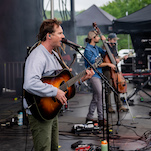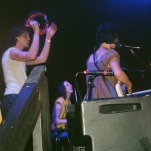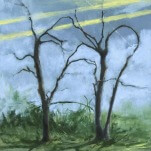On Food for Worms, shame Fill Up on Hope, Love and Other People
Vocalist Charlie Steen reflects on recording live and getting vulnerable on the London quintet’s third LP
Photo by Pooneh Ghana
Since releasing their first album, Songs of Praise, through Dead Oceans in 2018, English post-punk rockers shame have quietly been ruling the world. Their second album, Drunk Tank Pink, like its predecessor, was a brash indulging of heavy arrangements and introspective lyricism. Now, they’ve brought forth Food for Worms, a marvelous, romping affair unafraid of getting a little soft here and there. The record is loose and full of imperfections, due mostly to being recorded live in studio with the band acting as a full organism, just as they would onstage in front of a crowd.
In a litany of kaleidoscopic guitars and metronomic percussion that paces across the record brilliantly, shame have built an empire from influences, as vocalist and frontman Charlie Steen injects his own inner-Ian Curtis with a mirage of elastic, octave-surfing flair. The desperation and angst Steen and company wrote and sang about for four years has been replaced by a source material that’s deftly untapped: hope. Steen writes about everyone around him, forging an ecosystem within shame’s own habitat, and the rest of the band produce a sound that obliterates the sonic landscape they’d established on Songs of Praise and Drunk Tank Pink.
On Food for Worms shame teams up with post-punk and synthpop producer Flood, who’s worked on records from New Order, PJ Harvey, Depeche Mode, U2 and Interpol, just to name a few. Flood’s resumé speaks for itself, yet shame has added something singular and auspicious to the list. Food for Worms will stick with you. You’ll be humming the backing harmonies from “Fingers of Steel” on your daily walks; the wah-wah distortion on “Six Pack” will melt the faces of your entire family tree. “Everything in this room was made just for you,” Steen sings on the latter. Lucky for us, everything on this record was made to replenish our souls. Last month, Paste sat down with Steen to talk about Food for Worms, balancing accessible lyrics with deeply personal mementos and arising from the ashes of adolescence with a more mature lease on adulthood.
Paste: Something that has stuck with me for a few weeks is how you consider Food for Worms to be the “Lamborghini of shame records.” What is it about this new LP that has injected a new life into the band that you guys have never felt before?
Charlie Steen: I think, on the Lamborghini thing, it’s one of those Hollywood blockbuster one-liners. The way we’ve been describing it is that it’s the most united album we’ve done so far. I think the reasoning for that is that we recorded it live, which we’ve never done before. It was about everyone having to be present in the moment and work together. We’ve been playing it live and it was written for the live show. There wasn’t any reliance on anything else for it to sound good, any kind of synth line or percussion or anything like that. We were able to play in the room and believed, personally, that the core of the song was good enough on its own. And I think everyone’s singing on it and everyone’s involvement was really heavy on it, as well. It’s always been heavy involvement, but it really felt like this was an album we did in a room together, you know?
Paste: What does having a producer like Flood onboard for a record do for its shape, when it’s all said and done?
Steen: He’s got decades and decades’ worth of experience. He’s very old school, as well. It was almost like bootcamp! We all got pretty fit and healthy, because you’re going through takes constantly. There’s no bullshit glamor or fat. We recorded the last album, Drunk Tank Pink, in Paris and the [Songs of Praise] in Wales and it was all beautiful. Then, this record was done in Willesden, with the concrete and the ambulances going by all the time. It felt very sort of, you know…You’re there to work. There wasn’t much slacking off, or anything. You can’t go and take a bath halfway through, unless you get into the sink in the kitchen. I think [Flood] brought a mentality.
We wrote the songs off instinct, first, for the live show. And then, it wasn’t until we came into the studio that we started to analyze them. Nothing really changed that drastically, but, over the course of recording, we would try different things. He would suggest something new to do and try it. He gave away some good pearls of wisdom, one being “Don’t think of any song as a single. It’s the kiss of death.” In the past, when we were doing our second album, we were more prone to that, as you naturally are. You overthink and you flog it. With this one, there’s not a lot of overdubs. There’s not a load of synths or percussion. It was just more about the feeling, more than anything else. I was trying to avoid using that word, it’s pretty lame.
Paste: When it works, it works. I find it interesting that you tested the songs on the road before recording them for the record. It makes me think about how many of the European artists who I’ve gotten a chance to speak with have almost always mentioned that they are taking new tracks and experimenting with them live before hitting the studio. American artists play new songs live before putting them on albums, but they don’t talk about that process as much. Is that experimentation a big part of the working culture as a touring musician in Europe?
Steen: It’s interesting because, the bands who we’re friends with, the majority of them have only done two or three albums. So, it’s still relatively early on. With our second album, we didn’t get the chance to road test any of that material. Some songs, we did [play live], but not in the way we did Food for Worms. It’s like going back to the way you write your first album. You have a gig coming up and you need songs to play at that show. We spent all of 2021 jamming and coming up with good ideas, but no songs. And then, in 2022, our management set us that challenge, which is, in two weeks time, you get to play two shows at the Windmill in Brixton and you have to have a completely new set of songs. That put the fire up our ass, and asses, plural. It’s important because, the band is fucking incredible. I’m not one of the musicians in that capability. But, I think, I can say that, you can practice a song live in a room a load of times, but it isn’t until you play it on stage that it gets inside your skin.
There’s a line by Brian Eno, “the song isn’t finished until it’s played live,” and that’s because, all of that time you have to make mistakes and the time you have to take a break and redo it in a studio, that all vanishes as soon as you go on stage. You’re really just acting on instinct. And, also, it’s like co-writing. I think that’s what a lot of this album was. You play the new songs live and you can tell which one’s work and you can tell which ones don’t, because that’s when people start going to the bar to get another drink. You get an immediate gauge.
Paste: I know that, because of anxiety, you canceled a big tour after the first record and then that experience really formed Drunk Tank Pink. It was like this big swell of worry and displacement, which so clearly speaks to what you were personally going through. But in a lot of ways, Food for Worms rings much more hopeful. What was the catalyst for you, going into the themes of this LP?
Steen: There wasn’t a catalyst moment. It was more of a challenge. You have a show coming up, you have to write quick for it. You don’t overthink as much, necessarily. From doing that, it becomes a lot more natural. We wrote this album in three month’s time. It’s the most concise album we’ve done so far, because it’s a complete snapshot. The themes, musically and lyrically, are linked, because it’s a short period of time in which it was all written, [except for] three songs, “Six Pack,” “Different Person” and “Orchid” were taken from 2021.
The introverted tick of my ego didn’t really sell. I think we all naturally, after all that touring for Songs of Praise, become a bit more introverted. It was amazing for us to do that, because there’s a lot we took from it, like exploring harmony on songs like “Snow Day” and “Born in Luton.” Harmonies on Food for Worms are incredibly important. There’s only so long you can look inside yourself before you start getting bored. Food for Worms is much more about the close people who are around me. We’re 25 now, and I think it’s natural. Your best mates are like your therapists and your priests. There’s so much to talk about at the moment and communicate. This time in our lives, it felt interesting to talk about the people who are very close to me and not necessarily just my girlfriend. I don’t think we over-thought it at all.
Sean [Coyle-Smith] was coming in with lyrics for this album, as well, the chorus for “Adderall,” “Yankees” and “All the People.” Everyone was chiming in and I think we’d analyzed so much of the writing on Drunk Tank Pink that, now, it was going back to that thing, “if it feels good, just do it.”
Paste: Being almost 25 myself, Food for Worms feels unique and tailored to our age group. I love how the record is not about yourselves so much as it’s about other people, and I think you guys broach that in ways that are accessible yet still unique and personal. Do you ever feel yourself wanting to drift into cliches in your songwriting??
Steen: I think you need to be incredibly fucking good to be so simple. At the end of the day, we’re the people who have to get up on stage and play [the songs] and sing them with conviction and have that honesty to maneuver it. It goes back to the thing I was saying about not thinking of a song as a single, you know, “the kiss of death.” As soon as you start thinking about writing it for other people and how you think they’ll understand it…How do you write for 10 million people? At the end of the day, it’s what came out in that moment. I think Sean’s lyrics are excellent. “All the People” is very direct, simple and gets the point across really clearly. And that’s really amazing and something you don’t hear as much anymore, I think. But, for me, as a person as well, I’m interested, lyrically, in the nuances or the little details. The little adjectives that, to me, are the things that bind and make up a person, the ways we remember things and the way we identify people. It’s not as clear as “I just want to hold your hand,” but the intent is there, hopefully.
Paste: Food for Worms feels like your broadest stroke of artistry yet. I’m thinking about the psychedelia of “Six-Pack,” the blues riffs at the start of “Yankees,” and the Iceage type of melody on “Alibis.” You’ve most certainly transcended genre labels on this record, so I’m curious if you and the band have ever felt pigeonholed as a “European post-punk group?”
Steen: Yeah, I think more so about the band than myself. I think, all of us, we’ve been doing interviews recently about the band, musically, broadening out. It sounds weird to say, but I think Food for Worms just sounds like us, and that’s a pretty vague term. When we first started the band, there were these bands we were getting exposed to, like The Fall and Gun Club, and we drew on that. Then, with the second album, there was this wave, hyper-breed, of newly formed bands on the streets of London, and everyone was getting inspired by that, as well. I think Food for Worms was a certain level of confidence. I think everything’s derivative, but I think it’s easy to be like, “I like that, I want to do something like that.” And that can definitely be great. You think about the song itself, you think about what it needs, what’s going to make it good. You’re not trying to make it 3:30 so it can go on radio or trying to chop, chop, chop, unless it needs it. I think we took this direction that was natural. I think Sean is listening to a lot of Jeff Buckley and a lot of American musicians in general, actually. At the end of the day, the only thing we wanted to sound like is something that sounds good to us. It doesn’t matter if it’s really post-punky or if it’s Americanary, which I don’t think this album is. [It matters] if it sounds good and like whatever Eddie [Green], Josh [Finerty], [Charlie] Forbes and Sean are being influenced and inspired by.
Paste: It’s a testament of “This is what we’re into and this is what we feel comfortable making, and if it sounds different, that’s just how it goes.
Steen: Going back to accessibility [on Drunk Tank Pink], I think we were like, “Oh, do these songs link to Songs of Praise?” And, I just don’t think it does any good. You can’t be like, “Oh, I want to write a song that sounds like this.”
Paste: Recreating the same songs over and over, it works for some artists, but not everyone.
Steen: I wish we had a formula!
Paste: Sometimes not having a formula makes it more exciting.
Steen: Exactly. The formula we found was writing for live shows again, and that was what made [Food for Worms] work.
Paste: Something that really surprised me was hearing Phoebe Bridgers singing harmonies on “Adderall.” How did that collaboration come to fruition?
Steen: In a pretty old-school way. We’d spoken to her before, once. We’d had an interaction when we were releasing Drunk Tank Pink, because she’s on our label. When we wrote “Adderall,” we were just like, “Oh, it’d be cool to have someone singing on this,” and we actually said Phoebe’s name. Then, we went in to record it and Phoebe happened to turn up in the studio that we were recording the album in. She was using the one below us for a few hours. She came up to say hello and then went back down. [The collaboration] wouldn’t have happened if it weren’t for Flood. We were all like nervous schoolboys drawing straws for who was going to ask. Sometimes, I find that, when you’re around Americans, it feels like you’re in a film already.
[Phoebe’s] manager came back into the room. He was a big time manager, clearly, and he was like, “Hey, excuse me. Are you Flood? I just want to shake your hand.” The beauty, which I love about Americans so much, it, sometimes, I question whether there’s a script writer right outside the room. Flood was like, “You can shake my hand, yes, but you gotta bring Phoebe back up here.” And her manager was like, “I’ll see what I can do.” And, she came in. It was five minutes, because she was going up to Birmingham to play a show. She was like, “Yeah I’m down,” and she did it and it was great. And then, she gave us a bottle of Moët that the Rolling Stones had given her, and I gave her a seven-pound bottle of Vinho Verde, which is green Portuguese wine. It wasn’t over DMs or over email or sending back voice notes and all that other shit. It was just very natural and, like the rest of the album, it wasn’t overthought.
Paste: Something about this LP that I really, really adored was how vulnerable it is, especially in the sense of showing love and affection toward others, especially men you have strong bonds with. What’s helped guide you through translating those tender reflections into the songs?
Steen: If there is any ethos to be found in this band, I think the core one would be the one from the beginning, exposing insecurities and making them your strengths and not being ashamed by them. I started taking my top off when we started the band, because I was really insecure about my weight. Not having a six pack and not having a voice like Aretha Franklin’s, we can’t all have those things, but some of us do. That’s true. We’re not the coolest people in the room, and that’s what it’s always been, the insecurities. It’s been about the slight anxieties and the things we feel shame in and having the confidence to openly discuss them. There are a lot of personal topics that you discuss with your friends and you really open yourself up.
I think, even recording [Food for Worms] live, it’s never going to be a completely perfect take. It’s going to have moments where someone’s a bit flat or someone’s guitar is not completely in tune. It’s real and that vulnerability is what’s real, isn’t it? That’s what should be embraced. In friendships, we can really confide in ourselves, in the people we love, and share the best moments of our lives with them.
Paste: The line “We were tourists in adolescence” in “Orchid” feels like the thesis of the record. Much of your songwriting on the first two LPs were very retrospective, while also ruminating on how the angst of teenage years and young adulthood were redirecting the future. What would be your analysis on where the band is now?
Steen: The adolescence we had has gone and it was something pretty unique to the five of us’ experience. We all grew up together in the same area of London, and everyone else went off to university or got 9-to-5 bar jobs, or whatever. We were touring, and you’re a bit of a baby when you’re on tour. You’re coddled to an extent, someone tells you where to go and where to be and what to eat. And then, you come back and you see your friends and they’re all working. It felt like we were exposed to quite a lot and quite a little at the same time. I don’t know where we are now. I think we will just feel pretty confident and pretty at ease. We’re all pretty chill, just living in London, trying to pay the rent. Shit like that.
Matt Mitchell is Paste’s assistant music editor, and a poet, essayist, and culture critic from Northeast Ohio. Find him on Twitter @matt_mitchell48.







































